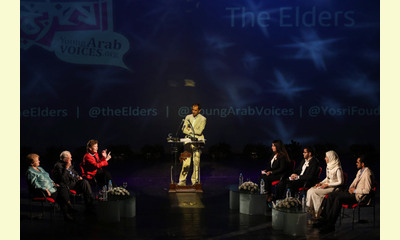|
|
Protecting fundamental freedoms, online and offline
un article par The Elders (excerpts)
In a blog for Skoll World Forum on Human Rights Day 2012, Mary Robinson argues that we must protect the internet as a space where fundamental freedoms prevail.

Mary Robinson speaks at The Elders' debate with Egyptian youth, Cairo 2012
click on photo to enlarge
"Having been UN High Commissioner for Human Rights, I am all too familiar with the argument that human rights is a ‘Western’ concept. The uprisings that began to shake the Arab world almost two years ago, and the developments that have followed, are one great example of the fundamental flaw in this argument. In Egypt, Tunisia and elsewhere we saw an unprecedented expression of the universal desire – long-repressed – for dignity and freedom. . .
"Unfortunately, the same tools and platforms that have helped these freedoms to flourish can be manipulated to restrict access to information, monitor dissident activity and exercise greater control over citizens. They offer perhaps as many challenges to these freedoms as they do opportunities. Just two weeks ago we saw Syria’s government cutting off internet and mobile access to the entire country, just as Egypt’s government did in January 2011. Others are using international fora to lobby for greater powers for governments seeking to restrict citizens’ internet freedoms in the name of ‘security’.
"The internet has given rise to a new space and new tools for human activity, but it does not require a new set of rules. The internationally agreed rights to freedom of opinion and expression, to peaceful assembly and association, and to take part in government are enshrined in the very document that we have celebrated on this day for the past 64 years. These covenants should be applied to the online world in exactly the same way that they apply to the ‘offline’ world.
"In July this year, the UN Human Rights Council adopted a resolution affirming that these rights should be protected on the internet, which was a welcome step in the right direction. As I write, government representatives from around the world are meeting for the World Conference on International Telecommunications. Whatever is agreed at this forum could have profound consequences for internet freedom; it is vital that any decisions reached uphold the fundamental rights set down in the Universal Declaration in 1948.
"The slogan for this year’s Human Rights Day is ‘My Voice Counts’. In Egypt, we saw just how fervently people believe this to be true – each of us, whether we live under democracy or dictatorship, yearns to have some say in the decisions that affect our lives. The internet has provided us with new tools that strengthen citizen movements and promote greater democratisation and accountability; it has also proved a powerful tool for censorship and surveillance.
"Only by protecting the internet as a space where respect for fundamental human rights prevails can we hope to see more Springs, more Awakenings and ever greater freedoms in years to come."
|








|
DISCUSSION
Question(s) liée(s) à cet article:
Is Internet freedom a basic human right?,
* * * * *
Commentaire le plus récent:
Here are additional remarks from the speech by Mary Robinson.
It has been inspiring to see how new communications technologies have allowed us to expand the space for public debate in recent years. The internet has enabled an explosion of information and expression worldwide, and while I am sceptical about claims that Twitter and Facebook ‘caused’ events like the Arab Awakening, it is evident that social media was an indispensable tool in the dissemination of uncensored information and the coordination of public protests in the region.
This raises questions concerning the role of companies and highlights a critical gap – many business leaders are taking major decisions on their own, often without a firm understanding of their impacts on human rights. To help mainstream respect for human rights in corporate decision-making, the European Commission has embarked on a project to develop guidance for three critical industry sectors, including information and communication technologies, which are so important in today’s world. My colleagues at the Institute for Human Rights and Business and Shift are working with the Commission to develop this guidance in order to give practical meaning to the UN Guiding Principles on Business and Human Rights, which were adopted in 2011.
As these tools become more accessible to people around the world – by 2020 there will be an estimated 5 billion people with access to the internet – civil society becomes better-equipped to engage in public life. Citizens have used mobile phones and internet platforms to record human rights abuses, pressure leaders to become more accountable, and connect and work together across borders. As one young Egyptian told us, “the only borders now are on maps.”
At the same time, our expectations are getting higher – and this is a good thing. When we are used to finding information freely available online, we expect to have the right to access that information without restriction. When we see various world leaders on Twitter, we expect to be able to contact our own leaders directly through such platforms. . ... continuation.

|
|









